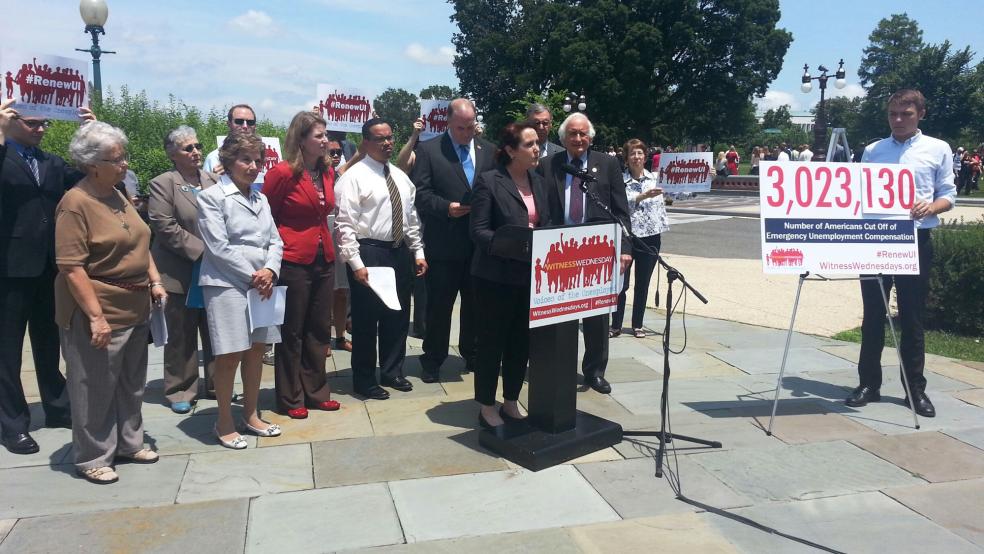Standing in the hot sun in front of the U.S. Capitol on Wednesday, Rep. Sandy Levin (D-MI) and a large group of lawmakers and activists read the personal stories of Americans who struggled to find work and ran into additional hardship when their unemployment insurance coverage expired.
Jerking his thumb over his shoulder toward the dome of the Capitol, Levin said, “For too many people in this institution, these are the forgotten Americans.”
Related: Senate Dems Make New Unemployment Insurance Push
Levin and his colleagues were participating in the first of a series of “Witness Wednesdays,” in which activists and lawmakers gather at the Capitol to share the stories of the long-term unemployed. Their goal is to persuade Republicans in Congress to agree to renew an extension of federal unemployment insurance.
The federal program, called Emergency Unemployment Compensation, extends the life of state-level unemployment benefits, which typically expire at about 26 weeks. Throughout the Great Recession and the long, slow recovery, Congress had routinely extended the program, but lawmakers allowed it to expire on December 28 of last year. Since then, more than 3 million Americans, who would have received another 26 weeks of benefits while they searched for work, have been cut off from benefits that others, less than a year before, received in full.
Activists are frustrated because the rate of long-term unemployment remains much higher than it has ever been when the EUC program has been shut down in past recessions. They also cite studies from the Congressional Budget Office and other sources that show the EUC extension itself adds jobs to the economy.
None of those arguments have moved House Republicans. Earlier this spring, a bipartisan majority in the Senate passed a five-month extension of benefits that would have been retroactive to December 28. House Speaker John Boehner (R-OH) has consistently refused to allow a vote on either the Senate bill or other House proposals, including one put forward by a member of his own conference.
Related: GOP ‘Runs Out the Clock’ on Unemployment Insurance
Rep. Dan Kildee, at the same event as Levin, said that the House was scheduled later in the day for a series of “two-minute votes,” in which members, literally, have two minutes to vote yea or nay on a particular bill.
“It would take us two minutes to vote to pass unemployment insurance and reduce a lot of misery” he said.
“Let us vote,” shouted Rep. Keith Ellison (D-MN) from the crowd behind him.
“But House leadership doesn’t have two minutes” for the long-term jobless,” Kildee continued.
In addition to lawmakers, the crowd included religious leaders as well as representatives from the Center for Effective Government, the AFL-CIO, the Economic Policy Institute, and the American Federation of State, County and Municipal Employees.
Related: Why Unemployment Insurance Won’t Be a Campaign Issue
The support of House Democrats, however, will likely do little to move the Republicans on the issue, according to several experienced Capitol Hill hands, partly because they are feeling little pressure to act on unemployment insurance from their home districts.
The unexpected defeat of House Majority Leader Eric Cantor (R-VA) in a primary election Tuesday night also put a damper on the expectation of any movement on the issue. When a staunch conservative like Cantor can be ousted by a challenge from the right, any cooperation with Democrats to extend an entitlement program is something most Republicans will likely think twice about.
But Levin, the top Democrat on the House Ways and Means Committee, said he remains hopeful.
“Now more and more of these stories are coming out and in a Democracy you have to have faith that eventually the voices of the people will be heard,” he said.
Related: Unemployment Insurance, Tax Cuts, Hit Senate Buzz Saw
Levin said that he has been in discussions with Sen. Jack Reed (D-RI), who has been one of the primary proponents of the extension in the Senate, and that another bill is being put together. This one, however, will not be retroactive, he said.
“They’re working on a bill,” Levin said. “I think there’s more of a realization that it’s going to be prospective. We probably can’t go back to December 28. But something has to be done. Something has to move here.”
He acknowledged that common ground with Republicans on the issue has been hard to find, but said Democrats intend to keep shining a light on the problem of the long-term jobless.
“That’s our focus now, because if the Republicans, in the end, decide to turn their backs…I guess they’ll make that decision,” he said. “But in a Democracy, you have to believe that eventually, the challenges before millions of people will affect what happens here,” he said, once again gesturing over his shoulder toward the Capitol.
Top Reads from The Fiscal Times



